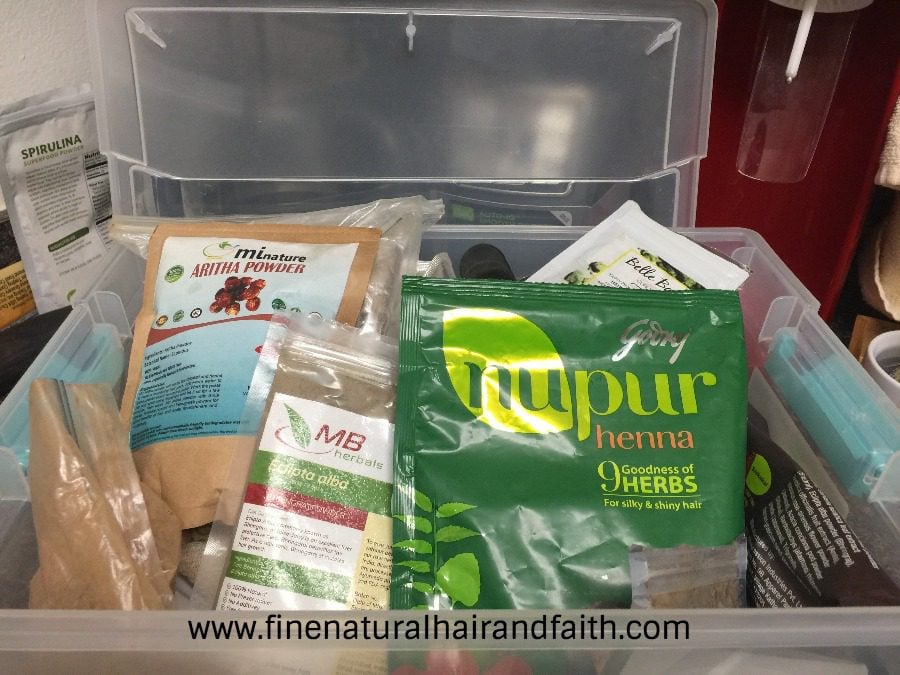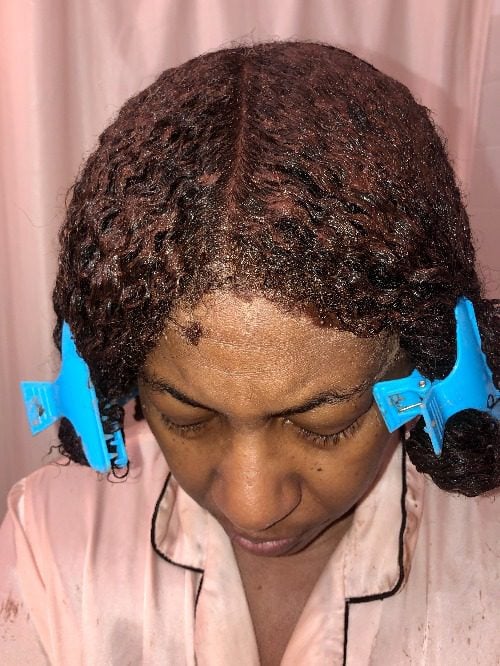Frizz Free Defined Curls with A DIY Clay Wash
Last updated on March 25th, 2025 at 04:45 pm
Have you been looking for the best organic clay for hair wash recipe for type 4 hair? I’ve got you covered! You’ll love this frizz free hair DIY even if you don’t have type 4 hair though.
This is an updated DIY Hair Mask recipe from what is shown in the photo below. The recipe is GOOD, but it’s best to use a negatively charged with a positively charged clay.
Creating DIY hair recipes like the Organic Clay for Hair Wash I’m about to share always seemed like a daunting task. This is especially true when there was more than 3 or 4 natural ingredients!
When I began dipping my toes into using all natural herbs, oils and organic clay for my fine hair, I kept it pretty simple. I used oils like coconut oil and hair butters like shea butter or mango butter.
I’d use a clay product for the occasional detox, but that was about it. Now it’s one of the curly hair essentials I wouldn’t want to be without!
Well, times have changed. Clays can be used to create the best hair products for frizzy hair. This is because they remove product buildup, while hydrating and smoothing the hair cuticle.
It’s been well over 20 years since I went natural, and the more I learn about the benefits of the various natural elements, the more I want to use them and pair them together for my herbal hair care routine.
DIY Herbal Clay Wash Recipe – Key Ingredients
This clay wash is a mixture of natural minerals including bentonite clay and kaolin clay. You can get these clays on Amazon but be sure to purchase pure or organic clay for your curl care.
Bentonite Clay – Rich in vitamins and minerals this clay is capable of cleansing the hair, removing toxins & heavy metals with its strong negative charge and defining curls. It may also provide some relief for seborrheic dermatitis.
Kaolin Clay – Has gentle cleansing and exfoliating properties. It’s great for fine hair, frizz prone hair and to enhance hair’s natural finish, volume and texture. It may also provide relief if you have seborrheic dermatitis.
Aritha Herbal Powder – When washing the hair with this herbal powder, your hair is left shinier, silkier and frizz free. Aritha also known as Reetha contains antibacterial properties and anti-fungal properties
Aloe Vera Juice – Nature’s moisturizer, Aloe vera juice helps to pH balance the hair, leaving it smooth and shiny. It can be used on all hair types to transform dry hair.
Rosemary Essential Oil – a super essential oil, rosemary helps to promote hair growth and thick hair.
Lemongrass Essential Oil – acting a bit as an astringent, pores are tightened in the scalp which discourages hair loss. Lemongrass also provides a refreshing kick to the clay wash

How to Make The Clay Wash
Combine all the clays in a plastic, ceramic or wooden bowl in these measurements:
1/2 cup of Bentonite clay
1/2 cup of Kaolin clay
2 tablespoons of Aritha (Reetha)
1/2 cup of water
1/2 cup aloe vera juice
15 drops of rosemary essential oil
10 drops of lemongrass essential oil
For the best results, you’ll want to combine all the clays together first.
Step 1: Combine powders
Carefully mix the clay ingredients. Use a whisk to blend them together. If you don’t have a whisk, a fork will do.
Step 2: Add liquid ingredients
Slowly pour in the water and aloe vera juice first to mix the clays into a smooth consistency.
Then, add the drops of essential oils and remix.
By combining the ingredients in this manner, you will get a much smoother consistency, which is best when it comes time to apply to your hair.
Here’s a spatula that you can use for applying the mask to your hair. It can also be used to further mix the recipe.
Benefits of Using This Clay Wash
When you put all of these ingredients needed to create this clay wash together, the benefits are cumulative (and especially beneficial for type 4 hair):
- Frizz free hair (no more flyaway strands!)
- Shiny, silky hair
- Curl definition
- Clean, detoxed hair and scalp
- Improved moisture levels
- Manageability
- pH balance
Why Use Organic Clay for Hair?
Clays are naturally occurring. For example bentonite clay forms from volcanic ash. Kaolin clay forms when rocks such as granite are weathered.
Rhassoul clay, also known as Ghassoul clay or Moroccan red clay, is actually mined from the Atlas Mountains in Morocco. It undergoes a different process to form a clay
Regardless of what clays you use, the safety of using them (even cosmetically) is definitely dependent on their quality, where they are sourced, their purity and if they have undergone testing and certification.
This is why it’s best to use organic clays when possible. You don’t want any nasty toxins or other pollutants in your clays. These which can cause skin irritation and even interfere with the efficacy of the clays.
Lastly, store your clay at room temperature for sustainability.
Substitutes/Alternatives/Variations for The Organic Clays
While this mixture was formulated to use bentonite clay and kaolin clay combined, you can substitute the bentonite clay with rhassoul clay when creating a hair wash.
Both bentonite and rhassoul clays have a negative charge so Bentonite is a flexible alternative for rhassoul.
Rhassoul clay perfectly compliments Bentonite clay, because it is capable of cleansing the hair while leaving natural oils in place. It detoxifies the hair/scalp while also softening it and removing toxins. Also, Rhassoul clay while it doesn’t really have antioxidant properties, it contains trace amounts of minerals with some antioxidant characteristics.
Natural Indian healing clay can be used in place of straight bentonite clay as well. However, while it’s not organic in nature many have used it reportedly with good results.
Kaolin clay can be negatively or positively charge depending on the different conditions that impact the Ph. So confusing I know!
Organic Clay for Hair Wash – DIY Recipe

Ingredients
Equipment
Method
- Mix all powder ingredients together first
- Slowly add and mix in water & aloe vera juice
- Once full blended to consistency, add the drops of essential oil
- Can adjust the amount of liquid to the consistency you like
The Instagram Faux Pas
I previously shared this DIY herbal clay wash recipe along with my results on Instagram and to say that there was massive interest in this recipe is an understatement.
Ladies were tagging their friends and also paying some compliments to my hair which is looking a bit thicker. There was however, one problem.
I was so excited to share this, I didn’t notice that I put the wrong quantity of liquid used to create the mud wash!
Yes, it was a blunder but not to worry though. There really isn’t any wrong amount. It’s about how thick or thin you want your herbal hair wash to be. To clear it up though, the amount of liquid I used to create this DIY clay wash above is what is correct.
FAQs
1. Does hair clay help hair growth?
Using a natural hair clay in your hair and scalp will help to remove product build up and detox the skin (your scalp). This sets the stage for a healthy scalp to grow your hair. It also helps improve the hair’s elasticity.
However, the specific use of clay in your hair is not what makes it grow. it doesn’t have an impact on your hair follicles other than detoxing them. It doesn’t increase blood flow in the scalp per say.
If you want to grow your hair, the best course of action is to:
- Build and be consistent with a healthy hair regimen
- Consume an adequate diet of nutritious foods
- Drink enough water for your body
- Retain the length you growth with length retention practices.
If you’re experiencing hair thinning, you’ll need to get to the root (no pun intended) cause of why this is happening. There could be health reasons. So, it’s best to check with your physician.
2. How do you use clay on natural hair?
There’s a number of ways to use clay on naturally kinky hair. One is mentioned in this article (as a hair wash to cleanse the hair). Other methods include:
- Detoxing the hair and scalp
- Added to a conditioner to help with curl recovery
- To massage the scalp to improve circulation
3. How often should I use clay on my hair?
There is such a thing as too much of a good thing. For those of us with natural hair, once or twice a month is sufficient. You don’t want to strip your hair of its natural oils which clays can do.
If you have very oily hair (highly unlikely if you have natural hair which is more prone to being dry hair), you can use clays in your hair more often up to once a week. The clay will absorb excess oil from the hair.
Tired of the Chemicals
If you’re like me and just tired of all the chemical infused hair products on the market, give this clays a try.
Yes, there are all natural hair products available but they don’t have long shelf lives and they typically cost quite a bit. That makes creating your own DIY hair products much more attractive.
Starting with creating your own cleansers (which coincidentally also condition the hair), you are going to
L-O-V-E this DIY herbal clay wash I shared above.
Conclusion/Final Thoughts: How to Use Organic Clay for Hair
To use the clay wash recipe shared about, apply a small amount of hair clay at a time. If you’ve never used clay in your hair before, you’ll want to test it on an inconspicuous area of your skin (example: nape of the neck) to make sure you aren’t allergic to it. It’s also a good idea to test if you have sensitive skin.
Then, apply to damp hair, not wet hair. Damp hair is just wet enough to allow you to distribute the clay through your hair. You don’t need to leave it on for a long time either 5 minutes or while you are in the shower completing your other shower rituals. Then, you can rinse it all out.
Using and creating natural products for your hair will definitely give you happy hair and healthier hair!
As a reminder, just because clays are natural doesn’t mean they are pure. Yes, they are better than products containing harsh chemicals but they can still cause skin irritation.
Always try to buy organic clay for hair recipes that you are DIY-ing. Even when purchasing manufactured hair masks, look for products that are made with organic clays when possible.
















Hey, Does it really gonna work on my hair texture.
you won’t know unless you try it.